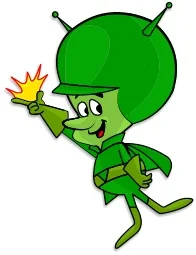Some call it an example of "jumping the shark" ( ya know, throwing some bizarre element into a once-popular but now-fading tv show in order to hopefully re-jump-start the ratings, but to no avail…). "The Great Gazoo," a kooky little green man from outer space suddenly landed, literally and figuratively, into the middle of the last season of The Flintstones. Most-dandily voiced by Harvey Korman, Gazoo had magical powers that more often than not screwed things up more than they fulfilled dreams. Gazoo could be seen only by Fred and Barney (because they discovered him), and Pebbles and Bamm Bamm (because they believed in him), so all sorts of hilarity ensued when Wilma thought Fred was berating himself when he was really giving Gazoo a piece of his "dum-dummy" mind. Gazoo could also materialize and de-materialize in a snap, and often on a whim. Life became most unpredictable with the Great Gazoo around.
I vaguely remember watching Gazoo-featured Flinstones episodes when I was a young girl. And yet, I more-than-vaguely remember not caring for this character at all. Gazoo seemed completely unconnected to the time, place and spirit of the rest of the show, and his capriciousness was quite off-putting. I guess I much more enjoy my prehistoric fantasy fitting into a nice, neat and already clever-enough box.
It's sort of -- I hate to admit it because I know it's not true -- the way I so often wish all of life would be: nice, neat, already filled with enough surprises. The same goes for the God who the Bible commands/invites/beseeches me to follow….
Imp at the Cathedral of Lincolnshire
My previous blog lifted up a most startling and for many off-putting portrayal of Jesus that circulated, as popular scripture, in the early Church. The Infancy Gospel of Thomas indulges us in tales of young Christ-as-uber-imp, causing all sorts of ruckus and shenanigans with his nascent supernatural powers. He blinds, dehydrates, strikes dead and then some any and all who get in his way, irritate him the least little bit or challenge his off-the-charts knowledge of the Law.
As things proceed, Jesus does learn to behave and use his powers for the good, sort of. Even as the Infancy Gospel ends, and with the familiar story of Mary and Joseph finding their lost 12-year-old son in the Jerusalem Temple astonishing everyone with his prodigious mind (and, as far as we know, maturely refraining from zapping any doubters), we're left wondering what this Jesus might be up to next, and whether or not we are the ones in for a next punking. Infancy Gospel Jesus, like the God whose child he most certainly is -- and the life they show us how to live -- remain forever free, unpredictable and potentially wild.
Even though this message may strike us as scary, it also contains a great potential for joy. If we look at things through the comic lens.
The flagrantly trickster Jesus of the Infancy Gospel is arguably excluded in our four "official" gospel tracts (although I would invite the debate on this to rage!). Nevertheless, through the comic lens, we can see the biblical Jesus stirring up trouble, and, perhaps with a mischievous twinkle in his eye, all over the place.
Take for example the story that follows in Luke's gospel shortly after the episode of young Jesus in the Temple (the one that also marks the end of the Infancy Gospel). In Luke 4, beginning at verse 14, Jesus comes to the synagogue in Nazareth to preach.
The scene is expertly set up. Jesus arrives with fabulous buzz. He's supposed to be a great preacher and the good folks who have come to hear him do his thing could not be any more thrilled that text he's preaching on - the one from Isaiah declaring his call to bring liberation, healing and all good things to those in need -- is exactly the good news they long to hear.
But then… Gotcha! Jesus expertly and effortlessly pulls the rug out from under the congregation, explaining point-by-delicious-point how all of these blessings will be brought to those beyond their walls, to despised foreigners and the kind of people sensible people should obviously avoid. "WHAAAAT??? Why we outta….." they in their own Ancient Near Eastern way proclaim.
All hell breaks loose as they angrily drive this horror to the edge of a cliff in order to hurl him over. And what does Jesus do?
He de-materializes, just like that. Like Gazoo and others of his impish ilk. Luke describes Jesus as "passing through the midst of them and going on his way" (v. 30), which is essentially like disappearing in a puff of smoke, although in Luke's version we have a better opportunity to giggle as we imagine the rascally smile on Jesus' face as he walks on by, surveying just how foolish and misguided he's been able to prove the "intelligent" people to be.
"What...Me Worry?" by John Seven
We're invited to delight in Jesus' prank, too, even as we hear the gravity of his message and smart from all the ways it pulls the rug out from under us and our comfortable (and misguided?) assumptions about God, Christ, Life.
Maybe by allowing ourselves to laugh along we're more willing and able to acknowledged and attend to the tough stuff. Maybe that's (one of the reasons) why Trickster Jesus shows up.
And he's not jumping the shark. (Although of course, being God incarnate, he could...)
Here's a video by a group of real-life tricksters, The Yes Men. Here, they pose as members of the WTO; it reminds me of Luke 4 and thought you'd (gulp) enjoy!
Here's a bonus (wonderful!) clip that also reminds me of Luke 4, through the comic lens....




